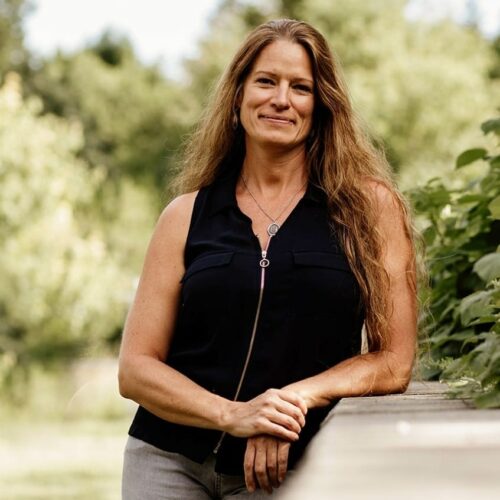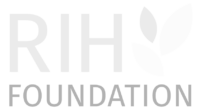Registered Midwife, RIH Head of the Department of Midwifery
Meet Joanna Norman, Kamloops’ first ever midwife and head of Royal Inland Hospital’s Department of Midwifery. With self determination being one of Joanna’s core values, each and every day she empowers people to become advocates of their own health and assists families throughout their pregnancy journey from start to finish. In this spotlight, you get an inside look into the profession of midwifery and witness the dedication and care Joanna brings with her with everything she does.

Tell me about the journey that took you to where you are today?
I spent most of my twenties as a mom with many diverse interests but no solid sense of direction yet. I knew I was interested in the health of mothers and babies, which led me to become a pregnancy outreach worker for the BC Pregnancy Outreach Program in my hometown of Salmon Arm. I did some training as a doula and during my third pregnancy, my midwife suggested to me that based off of my experience, I should look into a career as a midwife. When the midwifery education program opened at the University of British Columbia (UBC) in 2002, I applied and was accepted into the first intake. I moved my family from Salmon Arm to Vancouver, completed a midwifery degree and worked on the Coast for a couple of years. In 2008, there was an opportunity to relocate to Kamloops. At that time, there had never been any registered midwives in Kamloops which was a shock to me. With this ground breaking opportunity at hand, I applied for privileges at Royal Inland Hospital (RIH) and in October of 2008, I became the first registered midwife in Kamloops. In 2010, I started to recruit more midwives, ultimately establishing the Department of Midwifery in 2011. Since then, this profession continues to grow in Kamloops.
What drew you to the profession of midwifery?
Giving birth to my first child was one of the most memorable events in my life but I felt like some elements of care were missing in conventional medicine. At the time, I did not even know what a midwife was. During my second and third pregnancies, I decided to have my children at home and throughout the entire journey, I loved the way the midwives delivered my care, taking time to really listen, educate and support my decisions. I felt connected to my care providers and shared a relationship with them that I deeply respected and trusted. When the midwife assisting me through my third pregnancy suggested I should consider this profession, I thought about the impact midwives had on me and felt inspired to move forward in this profession.
What educational requirements do you need to meet in order to become a midwife?
The training takes about 5 years in total. UBC has the only midwifery education program in B.C. which is a four year bachelor’s degree that requires about a year of prerequisite training. This program is housed in the Faculty of Medicine Division of Family Practice and is set up in a very interdisciplinary way. It encapsulates the necessary medical training balanced with the science and art of midwifery philosophy and core values.
Can you share a little bit about the history of midwifery and how this profession came to be?
Midwifery is probably one of the oldest professions in the world. There has always been women helping women through birth. If you look at many other developed countries, midwifery programs are very well developed. In Canada, modern midwifery grew out of grassroots movements in the 60s and 70s during the height of the women’s rights movement. However, Indigenous midwifery has always been a part of Indigenous societies and so that existed here for thousands of years before colonial systems of healthcare. Many of our midwifery perspectives are informed by that Indigenous midwifery that already existed here. Prior to 1998, in BC midwifery was private and not regulated by our healthcare system. In the 1980s we really started to see the push for regulated midwifery to gain momentum. Senior midwives involved in leadership and advocacy at the time, helped to develop regulations and policy to integrate this practice into the healthcare system. Regulations under the BC Hospital Act came into effect on January 1, 1998. This led to the development of the UBC education program which started in 2002 and ultimately led to more Canadian trained midwives practicing in BC. In Canada, our regulations are held to national standards so any midwife trained here can practice in any province or territory and must be able to offer birth both in home and in hospital settings, with continuity, partnership with the pregnant individual, shared decision making, informed choice and advocacy as guiding principles.
Can you de-bunk any misconceptions about midwifery?
Many people think that if you choose to use a midwife you must have your birth at home and this is not the case. Many people don’t realize that midwives are regulated within the healthcare system and have hospital privileges, similar to a family physician. Secondly, people often assume that there is a large cost associated with using a midwife and don’t realize that this service is actually covered under your BC care card.
How would you describe your role as a midwife?
A midwife is considered a primary care provider. A midwife takes care of you throughout pregnancy, birth and early postpartum. Similar to a family physician providing primary maternity care, midwives can order routine prenatal investigations, ultrasounds, and provide prescriptions limited to maternal and newborn care. The model of health service delivery is quite different however. For example, midwives are able to spend a great deal of time with families in our care because we take on smaller case loads. The community based midwives in Kamloops provide pregnant individuals with dedicated care and focus on building one-to-one relationships over time. Midwifery takes a partnership approach to individual care. In my appointments I bring my training, expertise, and medical knowledge to keep you and your baby safe but you are the expert when it comes to your own values and how you see yourself as an individual and a parent. In this way, we partnership. My goal is to empower my clients to really engage thoughtfully and participate in their own healthcare decision making, and to support them through their unique journey in the way that they choose for themselves.
What impact do you hope to make with your work?
First and foremost, my goal is to take excellent care of the women and birthing families. That is what really feeds the heart of my work. It is walking each individual in my care through the journey of pregnancy and birth, it is also encouraging them to think differently about their own healthcare and helping them to feel empowered to ask questions and think critically about decision making. It is beautiful to watch people become stronger and clearer about what they want in their life and what they want for their pregnancy. It is incredibly rewarding to see people gain confidence and begin speaking for themselves, sometimes over the course of several pregnancies. On the policy side, I hope to continue changing the culture of how care is delivered at birth and continue elevating the value and visibility of maternity care and primary maternity care providers within our healthcare system.
What set of values do you try to live by everyday?
When I am driving to a birth in the middle of the night, I always put out a little prayer to the Creator: please be with us and guide my hands in this work to help me to keep this family safe. My heart is in this work. So, when asked this question two things came to mind. The first being gratitude – I am grateful for this life, all of the gifts and challenges, and the winding pathways that have brought me to where I am today. I am grateful for the gift of doing the work that I love everyday. The second is self determination – you can’t wait for your life to get easy before you decide to find joy and purpose and determine your path. There will always be challenges. If you find yourself unsatisfied in some way, either change what you are doing or change how you are thinking about it.
What is your favourite part about living and working in Kamloops?
I love Kamloops. When I moved here in 2008, I didn’t know if this was going to be my long term home. I think you actually have to live here to truly see the beauty of the land and experience the incredibly diverse natural environment that surrounds us! The community is so diverse and I love all of the cultural events, the festivals and farmers markets throughout the year. But it is getting out on the trail, or the water, or one of the other myriad of outdoor opportunities here that really recharges my spirit. This is a place that has something to offer everyone and there is opportunity for a really enjoyable work-life balance.
What does the future hold for you?
I’m not entirely sure. I feel like there is a gap in the health authority in terms of leadership options where midwifery isn’t really represented. There is so much to do to expand midwifery services and access to primary maternity care throughout the region. I definitely have my eye on how I can advocate and bring a midwifery perspective to higher policy levels. I also think Kamloops is the perfect location for a birth centre. The FNHA Aboriginal Doula Training Program ran trainings in Kamloops a number of years ago, and I had the opportunity to participate in a small way. It was really inspirational and I think it would be incredible to see an Indigenous birth centre here in Tk’emlúps te Secwe̓pemc – serving Indigenous families, and also providing opportunity for training more Indigenous midwives and doulas. This kind of initiative could only be led by the Tk’emlúps te Secwe̓pemc community of course, if they choose, but my dream would be to offer whatever knowledge and skill I possess to support such a project.
This article has been written in the words of Joanna Norman.

